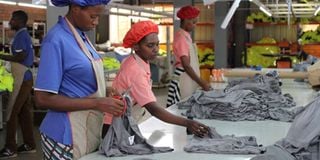Covid-19 spotlights discrimination women face

What you need to know:
- Covid-19 infections higher in men though women, by nature of their gender, are more affected.
- Women have a higher risk of exposure to coronavirus due to the care duties they undertake at home.
- While women are at the frontline in Covid-19 fight, they are not among key decision makers in its response teams.
- A number of women victims of domestic abuse continue to share shelter with their abusers.
- Pandemic is deepening pre-existing inequalities.
- Economic challenges during the pandemic pose a threat to young women’s work and business activity.
Past recessions have typically hurt men more than women, but Covid-19 pandemic is having a significant effect on women, girls, the informal economy and occupations with high female employment.
While data suggests that Covid-19 infections are higher in men, women, by nature of their gender, are more affected by the pandemic.
The global pandemic has the potential to deal a one-two punch; a major global health crisis and a global economic crisis that will persist well after the slowing down of the immediate health emergency.
While these shocks affect everyone, women - who comprise a significantly large number of low-wage workers and twice as many of its careers - may be particularly vulnerable to the economic and health crises that unfold in the wake of Covid-19.
Women have a higher risk of exposure to coronavirus due to the care duties they undertake at home, while at the same time are less likely to be treated or have their symptoms taken seriously. In addition, girls and women, especially those from marginalised communities and with disabilities, may be particularly affected by the secondary impacts of the outbreak.
DOMESTIC ABUSE
“One key insight we have gathered in our ongoing work tracking the economic impact of Covid-19 is that women are disproportionately affected negatively by Covid-19 crisis,” notes James Smart, a renowned journalist and founder of Tazama World Media.
A new paper, The Impact of Covid-19 on Gender Equality, co-authored by faculty from Northwestern University, USA, and Mannhein University in Germany has it that the long-term effects of Covid-19 on women may be more complicated.
The authors also note that while women are at the frontline in the fight against Covid-19, they are not among key decision makers in pandemic response teams.
Mass school closures have particularly affected them because women bear much of the responsibility for childcare.
BEIJING PLATFORM
Covid-19 has also ensured that a number of women victims of domestic abuse continue to share shelter with their abusers. In Kenya, teen pregnancies, sexual and domestic violence cases have dramatically shot up, with the latest statistics showing a more than 100 per cent spike in one month.
According to UN-Women, 2020 was intended to be a ground-breaking year for gender equality as it marked the 25th anniversary of the Beijing Platform for Action.
However, the spread of the Covid-19 pandemic has the potential to roll back the little gains made in the past decade. The pandemic is deepening pre-existing inequalities, exposing vulnerabilities in social, political and economic systems which are in turn amplifying the impacts of the pandemic.
“Across every sphere, from health to the economy, security to social protection, the impacts of Covid-19 are exacerbated for women and girls simply by virtue of their sex,” noted António Guterres, UN Secretary-General, in April when he issued a policy brief on impact of Covid-19 to women.
ECONOMIC CHALLENGES
The gendered economic consequences of Covid-19 will have serious long-term consequences for women’s economic autonomy.
According to Child Fund Kenya, economic challenges during the pandemic pose a threat to young women’s work and business activity, and expose them to increased risk of exploitation and abuse. Girls and young women facing severe economic shocks are more likely to take on high-risk work for their economic survival.
Covid-19 has amplified the lessons on the importance of protecting human rights and promoting gender equality when fighting a disease. The health, safety, dignity and rights, especially for women and girls, in all their diversity, must not be compromised.
“Just as HIV has held up a mirror to inequalities and injustices, the Covid-19 pandemic has put a spotlight on the discrimination that women and girls battle against every day of their lives,” says Winnie Byanyima, Executive Director of UNAids.




